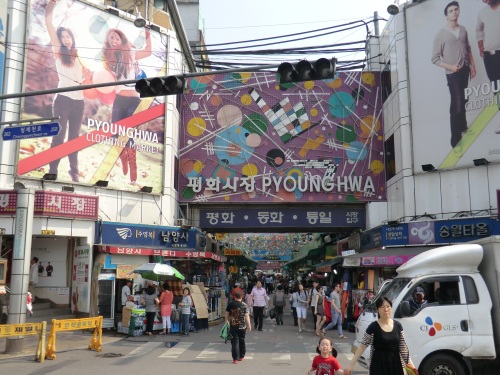
Off shopping at Seoul’s famous Dongdaemun market.
By Matin Durrani
Being a Saturday, the fourth day of the Physics World tour of South Korea was – to adopt cricketing parlance – a rest day. But don’t worry, I haven’t been slumped in front of my television in the hotel bedroom wolfing down South Korean style pot noodles and cups of tepid green tea all day. Oh no, that was just what I did in the morning.
Not long after midday, I emerged from my hidey hole and headed off in the bracing 30 °C heat for the efficient and wonderfully air-conditioned Seoul subway, which despatched me to one of the city’s most popular shopping districts – the Dongdaemun market. While this may sound like a dereliction of duty – surely I should at least be quizzing locals to find out how much they know about the Higgs boson or the KSTAR fusion programme – it did give me a chance to put into practice that hackneyed phrase so overused by TV foreign correspondents, namely of “getting a sense of the mood” in South Korea. (“The mood” in question usually being the opinion of the taxi driver the lazy hack exchanges a few half-hearted grunts with on the way from the airport to their five-star hotel.)

Some local delicacies on sale in Seoul.
Well, the mood that I “got a sense” of was of plenty of smartly dressed, healthy-looking, well-fed and seemingly happy people going about their normal Saturday business. In other words, apart from shopping, eating and drinking, most people were – in a trend replicated all over the developed world – engrossed in a communal act that would surely bemuse anyone teleported into the future from even 10 years ago. It involves, of course, gazing into tiny rectangular objects into or over which one occasionally and furiously stabs or slides one’s fingers.
Whether even a tiny proportion of South Koreans knows – or even cares – about the huge amount of physics that underlines the ubiquitous WiFi-enabled tablet or smartphone, I don’t know. But when you take a break from physics and look at the world with normal eyes, surely mobile computing and communication is the number one spin-off from physics research that most shapes, influences and affects everyone’s lives. (In fact, the whole principle of WiFi can be traced back to the Australian physicist John O’Sullivan.)
Having said that, I did see in downtown Seoul a surprising number of little stalls housing people, usually men, offering to engage in a spot of tarot-card reading to anyone wishing to fork out enough Won. Such spiritual services are quite common in South Korea and they just underline to me that the world places its faith in technology in some spheres of life but remains resolutely traditional in others. That is, I confess, hardly an earth-shattering conclusion but frankly, in this heat, it’s about all I can muster.
By the way, if you think everyone here feels suffocated by the recent war-mongering noises from the “dear leader” in neighbouring North Korea, well no they’re not.
At least that was “the sense of the mood” I got.
Guidelines
Show/hide formatting guidelines
this text was deletedwhere people live in harmony with nature and animals</q>
Some text